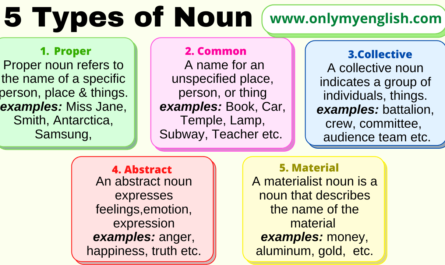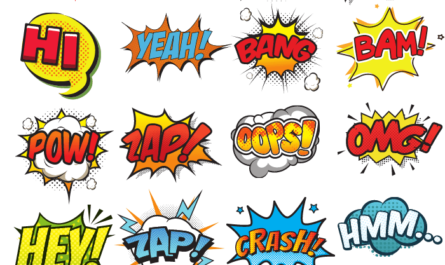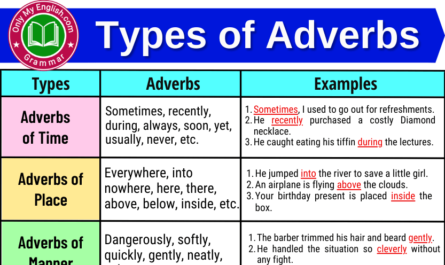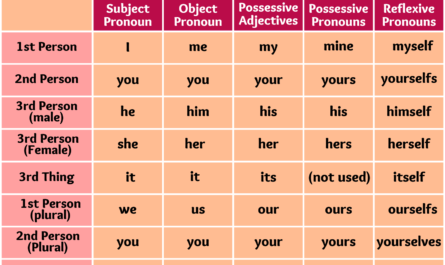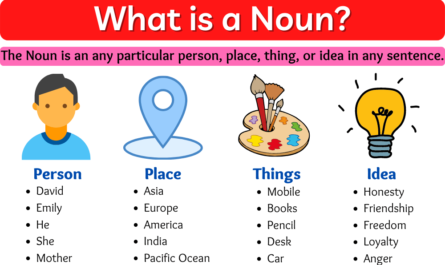A pronoun is a word that stands in the position of a Noun or a phrase they too have gender and number there are eight different types of pronouns.
examples: he, she, they, you, me, we, it, who, which etc.
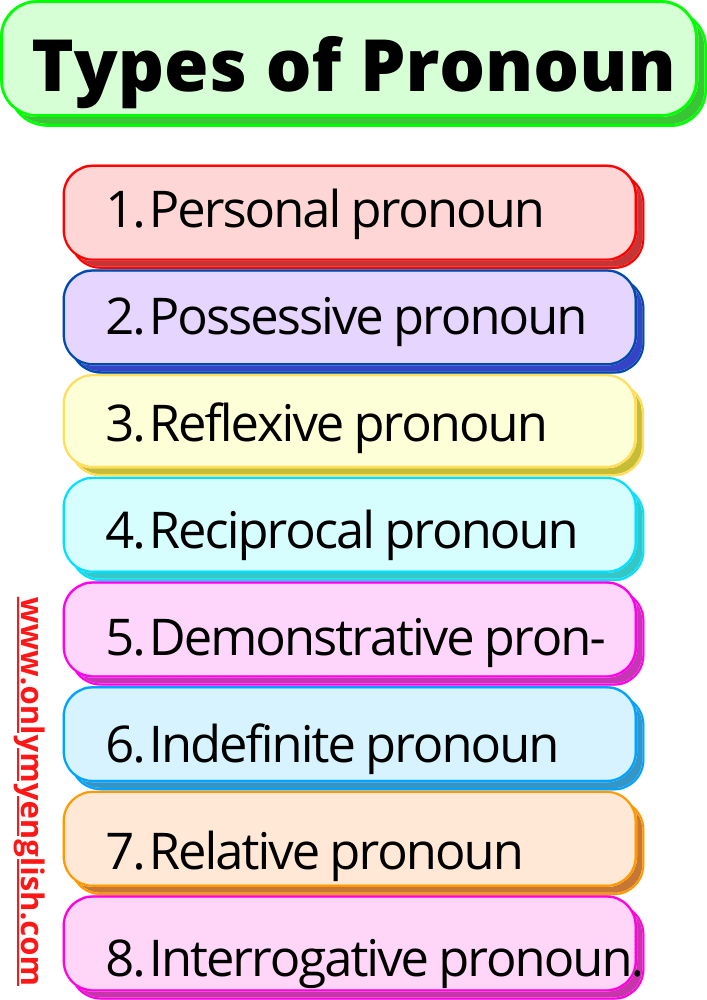
There are eight types of pronoun
- Personal pronoun
- Possessive pronoun
- Reflexive / Intensive pronoun
- Reciprocal pronoun
- Demonstrative pronoun
- Indefinite pronoun
- Relative pronoun
- Interrogative pronoun.
1. Personal pronoun:
The personal pronoun can be categorized by a person, gender, thing, or number.
Persons are of three types (first person, second person, and third-person) and it may be singular or plural depending on the sentence.
examples: I, we, him, you, she, he, it, they, me, her, us, and them are all personal pronouns.
Examples of personal pronouns
- You need to start upgrading yourself.
- He always reminds himself by keeping a reminder alarm on his cellphone.
- They have to focus on their exams.
- The entire function was decorated by them.
- I want you to come to my cabin immediately.
2. Possessive pronouns;
The possessive pronoun, which shows some possession quality or direct relation with someone else, is called a possessive pronoun.
examples: mine, ours, yours, his, hers, its, theirs, etc.
Examples of possessive pronouns
- We had spent a lot of time with Jimmy and his sister.
- You have to encourage yourself some time.
- Does this bullet kill you or me?
- I don’t trust you.
- This is my personal matter. Stay out of it.
3. Reflexive pronoun:
The intensive or reflexive pronoun is a word that is identical to a pronoun or a reflection of a pronoun that reflects back to the subject in a sentence. These pronouns can be ended by the suffix ‘self’ or ‘selves’.
examples: Ourselves (self), yourself, themselves(self), myself, herself, etc.
Examples of reflexive pronouns
- This whole property belongs to herself.
- He slapped himself in front of the public.
- Do not blame themselves for this huge loss.
- I took myself inside the museum.
- We don’t have to go to the party; we can enjoy ourselves.
4. Reciprocal pronoun:
The reciprocal pronoun is used, when more than one subject is acting in the same way.
Towards each other.
examples:
- To one another (when referred to more than two people).
- To each other (when we refer two people).
Examples of reciprocal pronouns
- Suzan and Jonathan gave each other diamond rings at their wedding.
- Cadets are wishing one another for their better future life at their farewell.
- Seetha and Geetha caught talking to each other during the examination.
- The kidnappers are blaming one another after their failure.
- Both are like best friends, always supporting each other.
5. Demonstrative pronoun
The demonstrative pronoun is used to demonstrate something specific or to improve nouns and pronouns in any sentence. This pronoun can be either singular or plural also it can be used in place of a noun.
Examples of demonstrative pronouns
- You could not have ever imagined this in your life.
- This sounds like a dog crying.
- That bike looks like a Harley Davidson.
- Can you share those pictures which we clicked last evening?
- Each of these is looking so funny.
6. Indefinite pronoun
An indefinite pronoun is used to mention one or more unidentified objects, places, or persons because they do not specify any precise object place or person.
examples: Any, either, nobody, someone, anyone, each, everything, all, both, several, much, etc.
Examples of indefinite pronouns
- Many of you are belonging to the same place.
- Somebody is absent in today’s class.
- Nobody comes forward to save that woman who caught in the road accident.
- Either you answer my question and sit or get out of the classroom.
- Everything is under the control of military forces.
7. Relative pronoun
A relative pronoun is used to attach a phrase to the noun or pronoun that is a place, people, animals, or things in any sentence. It can also operate as a possessive pronoun.
It can also be useful in connecting two sentences
examples: Whoever, whom, that, who, which, whose, what, where, when, etc.
Examples of relative pronouns
- The athlete who won the gold medal in a race is trained hard.
- The cake that I baked yesterday was so delicious.
- The selected candidates, whoever the management selects, will report tomorrow morning on the ground.
- Steak, which we eat yesterday at dinner, is one of my favourite meals.
- Everyone had enjoyed it a lot when the syllabus had finally finished.
8. Interrogative pronoun:
An interrogative pronoun is a pronoun that means to interrogate or to ask questions easily. It can also be used as relative pronouns sometimes or to ask an indirect question.
examples: Who, whose, what, which, and whom.
Examples of interrogative
- Who is going to tell a story?
- Whose Pendrive had lost yesterday?
- What are you expecting from me?
- Which people comes from a powerful place?
- You do not have any idea, to whom you are talking?
In certain situations, rarely used interrogative pronouns end with a suffix- ever, and -soever.
- Whoever, whomsoever, whatever, etc.
Example,
- Go and kill all the intruders, whatever you need, I’ll provide.

